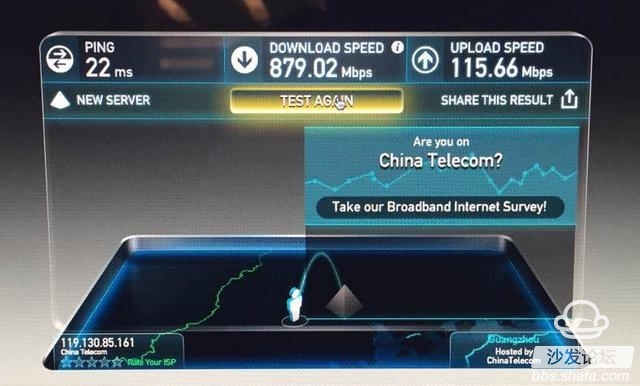
Just as everyone thought that the Gigabit broadband demonstration community proposed by the World Telecommunication Day on May 17 last year was still only in the concept implementation stage, the 1.18 Guangdong Telecom Gigabit Broadband New Product Launch Conference once again put the Gigabit broadband system in doubt. Topics brought into public view.
Aside from the influence of the Guangdong Telecom New Product Conference, the first heavy news in the Internet in 2016, the signal conveyed behind the meeting caught the attention of the author: Traditional operators seem to be making intensive efforts to speed up the Gigabit broadband deployment and try to Differentiated commercial applications and household products first attack the potential market of Gigabit broadband.
Can this signal bomb be understood as: Gigabit broadband will soon become the trend of the times, not far from the popularity of civil use?
From the "concept" to multi-city flowering Gigabit broadband will become a trend
The voice of doubting that: Currently in most areas of China, 100 megabytes of broadband have not yet penetrated universally. In some developed cities, although the home network reaches 100 megabits, the actual speed is limited, and the civil use of Gigabit broadband is unlikely to reach the height of popularization. .
And, in fact, China's broadband from 512kbps to 2mbps, although the bandwidth has been accelerated four times, it took nearly five years to complete; in theory, if you want to accelerate from 20MB to 1000MB, it will take at least 5-10 years to complete. How can it be possible? Suddenly like a spring breeze, Gigabit broadband is open everywhere?
Furthermore, the current 10M and 20M network bandwidths have basically met the daily needs of most users (watch high-definition video, play large-scale online games, video chat, or conferences, etc.), and the rigid demand for 100M or even 1000M ultra-wide bandwidth is not very strong. . Therefore, Gigabit broadband is still in the conceptual stage. It is still unknown whether it is popular with civilians.
However, does reality really think so?
If Gigabit broadband is still in the conceptual stage in 2014, then after 2015, with the construction of cities, market demand, national policies, and operators' own development and changes, Gigabit broadband has been put on the agenda.
As the largest Internet node in South China, taking Guangdong as an example, as of now, Guangdong Telecom has nearly 9 million optical fiber users, and its optical broadband penetration rate exceeds 50%. It is estimated that by the end of 2016, Guangdong Telecom will have more than 15 million optical broadband users. Wide penetration rate exceeds 80%; and more than 20,000 new users choose to use fiber broadband every day, and this data is still growing. The diversified information construction in the city has brought about the acceleration of Gigabit broadband access to the market. The intention of Guangdong Telecom's Gigabit broadband new product launch is also based on this.

On the other hand, on the May 17th World Telecommunication Day last year, China Telecom had piloted Gigabit broadband in multiple cities such as Shanghai, Chengdu, and Jiangsu Wuxi, and the market response was generally good. This, together with Guangdong Telecom’s move, may be in 2016. The cities have been piloting one after another; within a year or less, the rapid deployment of multiple cities has begun, and those who are still doubtful about the sound of Gigabit broadband are still in the concept stage.
In addition, the level of broadband development has become an indicator of a country’s overall national strength, and vigorous development of broadband has become a global consensus. According to the study of the World Bank on 66 high-income countries and 160 low- and middle-income countries, broadband has boosted economic development by 1.38 percentage points for every 10% increase.
As a developing country, the development of broadband has started on the fast track from the request of the telecom operator to raise speed and reduce fees after Premier Li Keqiang sent a speech. After more than a year of construction, most of the economically developed regions have already covered cities and villages with optical fiber. The province has completed all light changes.
Even if the market believes that Gigabit broadband is still in the conceptual stage, China’s economic development will not allow it to be merely a concept. According to this speed, Gigabit broadband may enter the large-scale promotion stage in 2017 and 2018.
Gigabit ultra-wide generates more commercial applications for civilian use in sight
Dr. John C. Klensin, chief research scientist at the Massachusetts Institute of Technology, once said: “The Internet has a rule that higher bandwidth can improve the quality and speed of applications that are not currently running well, and can also lead to many new applications. Appears, and these new applications will put more pressure on bandwidth to promote its development, so that the cycle is repeated."
Indeed, since Gigabit broadband has become a major development trend, more commercial applications and civilian products that carry Gigabit broadband have also entered the market one after another.
In foreign markets, Google launched Gigabit broadband service, Google Fiber, in the earliest days of 2012. Currently, it has launched Gigabit broadband services at a very affordable price in cities such as Kansas City; Telecom giants such as Verizon and Comcast in the US Gigabit fiber broadband continues to develop new products and services; Netflix and other video sites have also launched 4K Ultra HD video services, and SONY also provides 4K video download services.
Mozilla, the developer of Firefox, has also launched "Hive Learning Community" education programs, digital media education programs, and more. Previously, Mozilla has also launched a similar Gigabit broadband application development reward program, such as encouraging the development of ultra-broadband-based emergency rescue systems, virtual fitness equipment, etc.
Looking at the domestic market, some domestic video content manufacturers such as LeTV and iQiyi have also launched 4K content channels; Guangdong Telecom also released 4K HDTV last year to provide high-definition video programs for everyone.
In 2018, it is also expected to usher in the marketization of 8K ultra-high-definition televisions and truly bring the value of Gigabit broadband into use.
You will definitely say that 8K ultra high definition and virtual reality (VR) are still far away from us. Is there a Gigabit broadband application that really fits into the civilian market? Would it be best to use it immediately? The answer is definitely yes.
For example, Guangdong Telecom’s domestic application “Guangdong Think†HD video phone launched at the conference, the video standard format has reached 720P (1280×720), and can achieve multi-terminal interoperability, such as TV and TV, TV and mobile phones, and mobile phones. High-definition video calls between mobile phones, dial-up calls, one-click answering; can meet the long-term need for family-friendly video calls for business, migrant workers, students, and family members, and can meet the needs of extended video calls such as telemedicine, education, and fitness in the future. Stay at home and enjoy the professional services of various experts.
Another "Unified Communications" office application video conferencing phone launched by Guangdong Telecom is also an application product that will soon be popularized. It can be widely used in all corporate video call scenarios, such as conferences, training, on-site inspections, remote counters, etc. Wait.
In addition to the carrier giants accelerating the deployment of Gigabit broadband, private companies such as Dr. Peng, Founder Broadband, and Century Internet have also pushed Gigabit broadband, also trying to attract home users through differentiated competition. Through market competition, perhaps more like "Yuexiangjia" high-definition video telephony products can emerge, really used by the people, the market has become more perfect.
Help the Internet + and promote smart life
The previous article said that so many Gigabit broadband, which in the end can use Gigabit broadband to complete what function?
There is a saying that Gigabit Broadband downloads a high-definition movie for about the same time as a microblog, and downloading a song is doubtful that the computer has not yet responded.
The downlink rate of Gigabit broadband can reach 1000M (1G), which can greatly improve the efficiency of data transmission, shorten the time of data transmission, and achieve extremely fast cloud storage.
Gigabit broadband is not only used to download movies and browse web pages. It is based on a highly efficient and fast Gigabit optical network that can play 4k HDTVs and even 8K ultra HD videos. At home, it can open video conferences and play large-scale somatosensory games. It can also be used at home. Virtual reality watch football games and concerts, the atmosphere is as realistic as at the scene.
In addition to home ultra-high-definition entertainment, the typical application scenario of Gigabit broadband can also satisfy various home smart devices, smart monitoring and other data acquisition, 3D holographic video, smart driving, from virtual reality (VR) to smart sensors, etc.; It can also realize remote video medical care, long-distance video education, and government long-distance emergency rescue. In the future, the user's life can truly realize the intelligent connection and communication between the virtual reality of things and things, things and people, and people and people. In short, the application of Gigabit broadband will continue to infiltrate entertainment, consumer-oriented applications in the vertical industry, social livelihood services, and other areas, helping the Internet +.
The truth is always tested in practice, and the appearance of new things is always maturing in the voice of doubt. The author believes that with the efforts of operators and civilian enterprises, Gigabit broadband will enter our lives earlier and bring us closer to the dream of virtual reality.